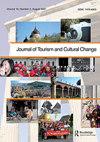Study abroad and the quest for an anti-tourism experience
IF 2.5
4区 管理学
Q2 HOSPITALITY, LEISURE, SPORT & TOURISM
引用次数: 4
Abstract
the brand image of such a destination to attract millennial travelers. In chapter 15, Smith illustrates the case study of the millennial tourist experience of Jamaica’s Rastafarian culture to point out implications related to the tourism-related preferences of this generation. By way of conclusion, Walia and Jasrotia summarize the preceding sections in the last chapter. They suggest that the relevant stakeholders should create a road map to develop spiritual tourism for millennials, arguing that it would promote society and culture more sustainably. The volume argues that millennials will be the next era’s main travelers, and that they will travel more to experience spirituality because of new work-life complexities. Modern tourists have a pathway to connect with their bodies, souls, and minds through spiritual practices, and it is not limited only to seeking blessings from a deity or engage in religious rituals. Indeed, the book addresses the connection of spiritual tourism with religious travel, but it also links spirituality with wellness, health, and medical travel. This is one of the first books of its kind to address the growing inclination of millennials towards spirituality in travel. Building foundations from the literature, and utilizing a range of qualitative, quantitative, and mixed-methodology approaches, the volume highlights the positive influence of spiritual tourism on the millennials’ work-life balance and quality of life. It focuses on the ways this cohort adopts travel to seek well-being, as well as their behaviors; it also sheds light on the increasingly important role that digitization plays in marketing and managing spiritual destinations for this new generation. Finally, it analyses the policies, practices, and consequences of spiritual tourism in the emerging period and discusses the strategic approach of its sustainable development. Overall, this is an informative text that is well suited for researchers in tourism, but also provides direction to the travel organizers and spiritual stakeholders in developing their business.留学与反旅游体验的探索
这样一个目的地吸引千禧一代游客的品牌形象。在第15章中,Smith举例说明了牙买加拉斯塔法里文化千年旅游体验的案例研究,以指出与这一代人的旅游相关偏好有关的影响。作为结论,瓦利亚和贾斯洛蒂亚在最后一章中对前面的章节进行了总结。他们建议,相关利益相关者应该制定一份路线图,为千禧一代发展精神旅游,认为这将更可持续地促进社会和文化。该卷认为,千禧一代将是下一个时代的主要旅行者,由于新的工作和生活复杂性,他们将更多地旅行以体验精神。现代游客有一条通过精神实践与他们的身体、灵魂和思想联系的途径,这不仅仅局限于寻求神的祝福或参加宗教仪式。事实上,这本书探讨了精神旅游与宗教旅行的联系,但它也将精神与健康、健康和医疗旅行联系起来。这是第一本讲述千禧一代在旅行中越来越倾向于精神的书。该卷以文献为基础,采用一系列定性、定量和混合方法论方法,突出了精神旅游对千禧一代工作与生活平衡和生活质量的积极影响。它关注这一群体通过旅行寻求幸福的方式,以及他们的行为;它还揭示了数字化在营销和管理新一代精神目的地方面发挥着越来越重要的作用。最后,分析了新兴时期精神旅游的政策、实践和后果,并探讨了精神旅游可持续发展的战略途径。总的来说,这是一本信息丰富的文本,非常适合旅游研究人员,但也为旅游组织者和精神利益相关者发展业务提供了方向。
本文章由计算机程序翻译,如有差异,请以英文原文为准。
求助全文
约1分钟内获得全文
求助全文
来源期刊

Journal of Tourism and Cultural Change
HOSPITALITY, LEISURE, SPORT & TOURISM-
CiteScore
5.10
自引率
9.10%
发文量
31
期刊介绍:
Journal of Tourism and Cultural Change ( JTCC ) is a peer-reviewed, transdisciplinary and transnational journal. It focuses on critically examining the relationships, tensions, representations, conflicts and possibilities that exist between tourism/travel and culture/cultures in an increasingly complex global context. JTCC provides a forum for debate against the backdrop of local, regional, national and transnational understandings of identity and difference. Economic restructuring, recognitions of the cultural dimension of biodiversity and sustainable development, contests regarding the positive and negative impact of patterns of tourist behaviour on cultural diversity, and transcultural strivings - all provide an important focus for JTCC . Global capitalism, in its myriad forms engages with multiple ''ways of being'', generating new relationships, re-evaluating existing, and challenging ways of knowing and being. Tourists and the tourism industry continue to find inventive ways to commodify, transform, present/re-present and consume material culture. JTCC seeks to widen and deepen understandings of such changing relationships and stimulate critical debate by: -Adopting a multidisciplinary approach -Encouraging deep and critical approaches to policy and practice -Embracing an inclusive definition of culture -Focusing on the concept, processes and meanings of change -Encouraging trans-national/transcultural perspectives
 求助内容:
求助内容: 应助结果提醒方式:
应助结果提醒方式:


